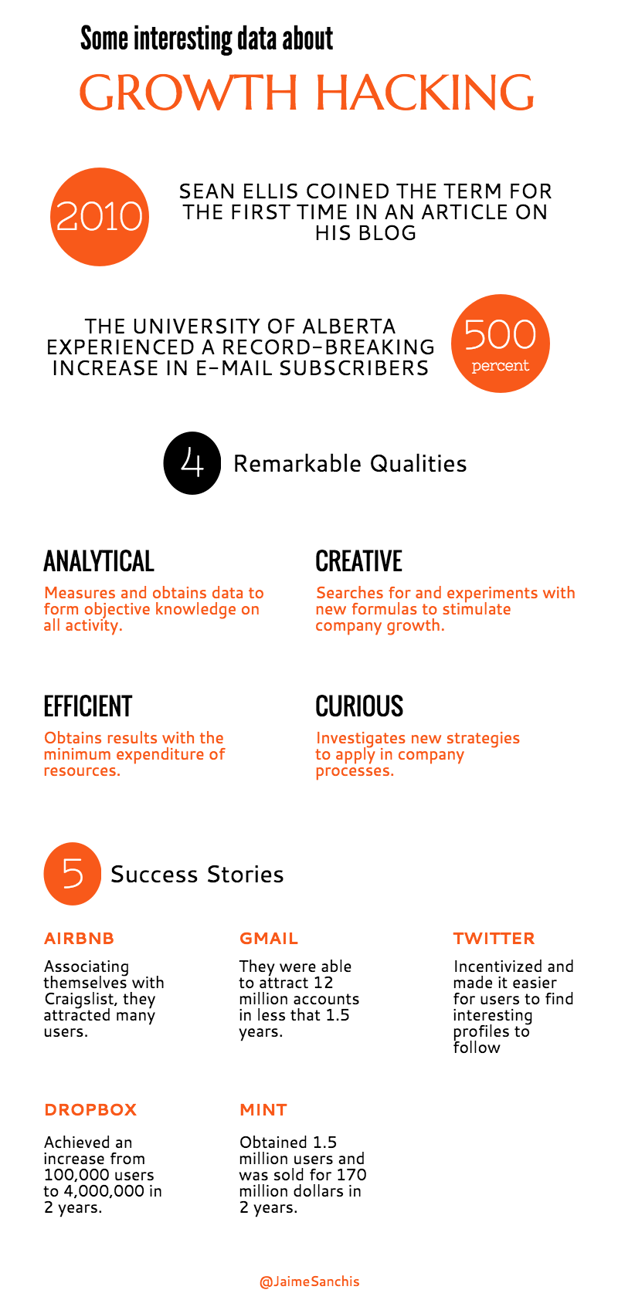Since 2010 when the concept popped up for the first time, there have always been debates and doubts about what exactly Growth Hacking is and the professionals who use it, Growth Hackers.
Many people have no knowledge or have never even heard of the concept; others mistake it for the malicious technique that some programmers use for less ethical and unrecommendable purposes.
Despite our possible initial ignorance concerning this topic, we should start awakening our “Growth Hacking” spirit by showing interest in this compound word.

If we pull the phrase apart, we find two words: Growth and Hacking.
The word hacker can have two different meanings. First of all, the equivalent to a informatics engineering expert, as we mentioned above, or on the other hand, it can define a person who thinks and believe in different ways, breaking the norm and discovering new solutions and paths to face problems. This second interpretation of the word should give us a few more hints that will further help us understand the concept.
Knowing this, we have a few questions to answer: What exactly is Growth Hacking? With my knowledge and skills… can I become a Growth Hacker?
Definition of Growth Hacking
My definition of Growth Hacking is the combination of techniques and tools that are mainly based on creativity, curiosity and analytics.
This combined technique stems from the need to make the most of scarce resources, increasing income and accelerating a company’s growth.
Its main mission is to maximize income with the minimum expense of resources. This is why Growth Hacker profiles are in very high demand among startups, as they are companies with limited resources and in desperate need of fast growth.
Lets not forget that Growth Hacking was a key element in the growth of startups such as Twitter, Facebook, Dropbox or LinkedIn.
It is a profile that demands extreme creativity, and the necessary attitude as well as aptitude to spur great company growth in a short period of time.

Growth Hacking and Marketing, aren’t they the same?
The definitions of Growth Hacking and Marketing, what exactly is the difference? The appearance of different terms, like Digital and Online Marketing, have made things slightly more difficult and have created a slight confusion between professionals and the audience. An important distinction to make is that between Growth Hacking and Marketing. In order to explain the difference, let us focus on professional profiles.
A Growth Hacker could be considered a marketer who stands out from the rest, who is extremely efficient, used to taking on big challenges and uses different tools to face them.
To explain this better, lets list how they differentiate from the rest:
- Growth Hackers are used to working in an environment of great
- They don’t usually have previous external information (market studies) about the product.
- They do not have access to the resources a marketing specialist would, such as the use of offline channels (radio, TV, etc.) or budgets to develop online campaigns on Google Adwords.
- The growth strategists face different goals regarding the growth of the company they work in. On the other hand, whereas a Marketing professional will have more moderated growth targets, a Growth Hacker should provoke a great growth in his company (mainly in startups) in as short a time as possible and with limited monetary resources dedicated to that end.
It is true, however, that both profiles share many of the same Inbound Marketing tools, such as SEO, Content Marketing, Social Media Strategies and Web Analytics, due to their low costs and excellent results.
Any growth strategist is always finding new ways to acquire new customers and retain current ones, combining their Digital or Online Marketing skills with their Analytical ones, as well as their knowledge on the development of their company’s products.

Growth Hacker Test
Having reached this point, its time to ask the question again – could we be Growth Hackers without even knowing it?
Knowing what we now know about growth hacking, we should know the answer.
If there are still any doubts left about whether not our profile fits in that of a Growth Hacker, we can auto evaluate ourselves by asking some of the following questions. Logically, the results are merely indicative, but we could ask questions such as…
- Do you consider efficiency to be one of your goals when performing tasks?
- Do you consistently try out different tools?
- Do you create and try out new methods in your job?
- Have your ever worked for a startup?
- Do you have any knowledge about analytics tools?
- Do you usually analyze everything down to the last detail?
- Do consider yourself a curious person?
- Are you skilled in SEO?
- Do you consistently use Social Media as a part of your strategy?
- Are you permanently up to date with the new trends?
- Do you know and use A/B Testing?
- Do you have any technical knowledge of programming?
- Do you create new ways to generate incentives for consumers?
- Do you generally change your strategy if you see it isn’t working?
- Do you have any knowledge in Email-Marketing?
- Have your ever created a Landing Page?
- Do you use Gamification in your strategy?
- Do you have experience in Traditional Marketing?
- Have you ever used Digital Marketing tools?
- Do you have any knowledge in the technological sector?

Once you have answered these questions with YES or NO answers, we can analyze the results according to the percentage of YES answers:
- (100 – 80%): Has exceptional knowledge.
- (80 – 60%): Has noteworthy knowledge.
- (60 – 40%): Has basic knowledge.
- (40 – 20%): Does not have sufficient knowledge on the subject.
- (0 – 20%): Has limited to no knowledge on the subject.
Conclusion
As we have seen, Growth Hacking is more than the technical trend of the moment.
Growth Hackers are currently a very sought after profile within startups and should be given more importance in larger companies also. The optimization of resources to maximize a company’s countable benefits should be an absolute “must” in any organization whose goal is to grow in a constant and sustainable way.
Any CEO should consider including a Growth Hacker specialist, for their company to achieve an increase in the demand of their products as well as maximize their income while using the minimum amount of resources.
Jaime Sanchís (Guest Author)





Leave your comment and join the conversation